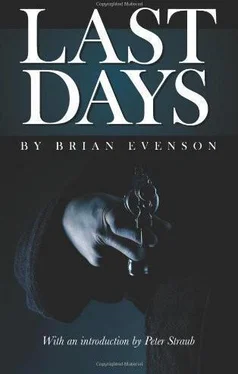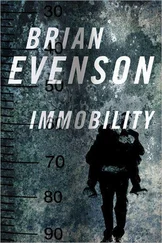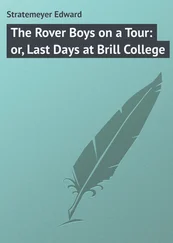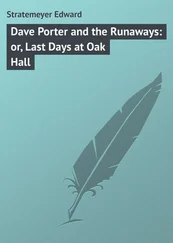When Ramse returned, he turned the tape off.
"It's all arranged," said Ramse. "Borchert will see you."
"Good," said Kline, standing up. "Let's go."
Ramse looked a little surprised. "Oh, not today, Mr. Kline," he said. "He can't do it today."
"I need to see him today."
"He can see you in three days," said Ramse. "That was the best he could do."
Kline pushed past Ramse and went out the door, out of the house. He could hear Ramse calling after him, loudly. He walked briskly across the gravel-ridden lot in front of the house, turned down the road, cut at the right moment down the path to dip down through the trees. He wondered if Ramse was following him. He broke into a jog.
He came up over the top, the tree-lined path, the house looming up, the gate before it, a guard darting out again from behind a pillar of the house, standing at the far side of the gate regarding him with one eye. He couldn't tell if it was the same guard as before.
"What is wanted?" asked the guard.
"I'm here to see Borchert," said Kline, moving forward until he was nearly touching the gate.
"Borchert isn't seeing anyone today," said the guard.
"He'll see me."
The guard swiveled his head a little, fixed his remaining eye hard on Kline. "No," he said. "He won't."
Kline reached across the top of the gate and punched him. He was prepared to feel his hand strike the guard's temple but the sensation of his stump striking it was an odd one. It ached. The guard fell to the ground without a word, and as he struggled to get up Kline clambered over the gate. He kicked him a few times until he was sure the guard had stopped moving.
By the time he was knocking on the door of the house, he could see Ramse nearing the gate. The gatekeeper was still down but on his knees now, struggling his way up. He knocked again and the inner guard cracked the door open and said "What is wanted?" and Kline, without awaiting a response, kicked the door hard so that the edge of it split open the man's forehead and he stumbled back, spattering blood. Kline struck him open-palmed on the chest, knocking him down, and rushed by, down the hall and into the stairwell.
But before he had made the third floor he was struck hard on the back of the head. A stair tread rose up and struck his face. By the time he got up, there were one-eyed men all around him, and his own blood was getting into his eyes. Then they were hitting him so hard and so often that he could no longer hear, or rather what sound there was came in waves, and it seemed that he was falling down more stairs than there were stairs to fall down, and then, after that, he had a hard time even remembering that he was human.
When his eyes focused again, there was Borchert, above him. He realized he was lying on the floor of Borchert's room, blood coming in phlegm-streaked ribbons from his nose. He pulled himself up to sitting, wiped his arm across his face.
"Well, Mr. Kline," said Borchert. "It seems you wanted to see me quite badly."
Kline said nothing.
"What is this all about?"
He tried to speak but before he could get anything out had to swallow back blood.
"Was it worth it, Mr. Kline?" asked Borchert. "It was once such a lovely face, too. Are you willing to trade your face for a little face-to-face conversation?"
"I need to see them," said Kline.
"Them?" asked Borchert. "My dear Kline, who?"
"The people on the tape."
"Mr. Kline," said Borchert. "You're a one. You can hardly expect someone in the double digits-"
"I need to see them," said Kline.
"But Mr. Kline-"
"Something's wrong with the tape," said Kline. "With the questions. It doesn't all mesh."
Borchert looked at him, coolly. "I don't think that you should let the tape trouble you, Mr. Kline. Why don't you simply accept it for what it purports to be?"
"Because it's not what it is," said Kline.
Borchert nodded slowly. "Very well, Mr. Kline," he said. "What do you propose?"
"I need to see them," Kline said. "Rules or no."
"And you want me to make the necessary arrangements. You're certain of it?"
"Yes," said Kline.
Borchert sighed. "So be it," he said. "I'll make the necessary arrangements, Mr. Kline. You'll see them tomorrow."
"I want to see them today."
"Not today, tomorrow. Don't push your luck."
Kline nodded, stood to go. His body was sore, bruised.
"Would you mind wiping your blood off the floor before you go, Mr. Kline?" asked Borchert, rising from the chair to stand perfectly balanced on his remaining leg. "And Mr. Kline," he said. "Now you have a history of violence. I advise you to be careful."

Late evening, Gous arrived with a half-empty bottle of Scotch cradled in the crook of his elbow, Scotch which was, according to him, compliments of Borchert .
"How kind of him," said Kline, flatly.
"Why he should care after your escapade this afternoon is beyond me," said Gous.
"Maybe that's why I only get half a bottle."
Gous nodded. "Do you have glasses?" he asked.
"No."
"I guess Borchert didn't think you rated glasses," said Gous. He fumbled awkwardly at the lid with his bandaged hand. "I'm going to have to ask you to open it," he said.
"How's your hand?" asked Kline.
"Nice of you to ask," said Gous. "Recovering nicely, thank you," he said, lifting the bandaged lump in the air. "I'm supposed to keep it elevated. And I shouldn't drink too much," he said. "Alcohol thins the blood and all that."
Kline screwed the cap off the bottle and drank. It was good Scotch, or at least good enough. He took another mouthful then pushed the bottle over to Gous, who, using his forearms like chopsticks, managed to get it to his mouth. He almost upset the bottle putting it back on the table.
"What made you change your mind?" he asked.
"My mind?" asked Kline.
"About amputation."
"Who said I changed my mind?" Lifting the bottle, he took another drink.
"Why would Borchert have sent over a bottle otherwise? Did you get a call?"
"I don't know what you're talking about."
Gous nodded. "It's nobody's business but your own," he said.
Kline reached for the bottle, watched the stump at the end of his arm knock against it, nearly knock it over. "Nobody's business but my own," he said, aloud, his voice sounding quite distant.
"That's right," Gous said. "That's what I said."
Kline could see on the end of his arm, the ghost of his hand, pale and transparent, sprouting oddly from the stump. "That's right," he heard himself say. He flexed his missing fingers, saw them move. They had cut off his hand but the ghost of his hand was still there. Perhaps this was what was meant by a call? Perhaps Borchert, shorn of most of his limbs, saw the ghosts of what was missing: vanished limbs grown uncarnate, pure.
He looked up. There was Gous, across the table from him, his eyes drooping, half-closed, his face mostly gone in shadow. Kline tried to reach for the bottle but couldn't find it.
"Where was I?" he asked.
He saw Gous' eyelids wince, come all the way open. "We should get you into bed," Gous said. "While I still can."
"It isn't Scotch," said Kline, to where Gous had been, but Gous wasn't there anymore. It took him some time to realize that Gous was there beside him, looming above him, trying to get him out of the chair. And then, without knowing how, he was standing, Gous beside him, and they were gliding slowly through the room.
"No," said Gous, slowly. "It is Scotch. But that's not all it is."
Fuck , thought Kline. "I thought you were my friend," he said, and felt himself falling. And then he was on the bed, sprawled, Gous sitting beside him looking down at him.
Читать дальше













